He may have the final say in the future of US stocks and cryptocurrency wallets
- 核心观点:Waller成下任美联储主席热门人选。
- 关键要素:
- 预测市场胜率暴涨至50%以上。
- 曾投反对票支持降息,获特朗普青睐。
- 准确预测经济软着陆,展现专业能力。
- 市场影响:或推动降息,利好风险资产。
- 时效性标注:中期影响。
Original author: David, TechFlow
With nine months to go until Powell's term ends, discussions about who will succeed him as Fed chairman have intensified.
The Federal Reserve Chairman is perhaps the most powerful economic figure in the world. A single word from him can dramatically sway the capital markets, and a single decision can influence the flow of trillions of dollars. Your mortgage rate, stock market returns, and even the volatility of crypto assets are all tied to the decisions made by this person.
So who is the most likely next chairman? The market has gradually given its own answer.
On August 7th, on the prediction market Kalshi, Federal Reserve Governor Christopher Waller's odds of winning surged from 16% the previous day to over 50%, surpassing all competitors for the first time. Although the odds have fluctuated since then, Waller has maintained his lead.
As of the latest data, Polymarket shows that Waller still leads with a 35% probability, higher than the 17% of other favorites Kevin Hassett and Kevin Warsh.
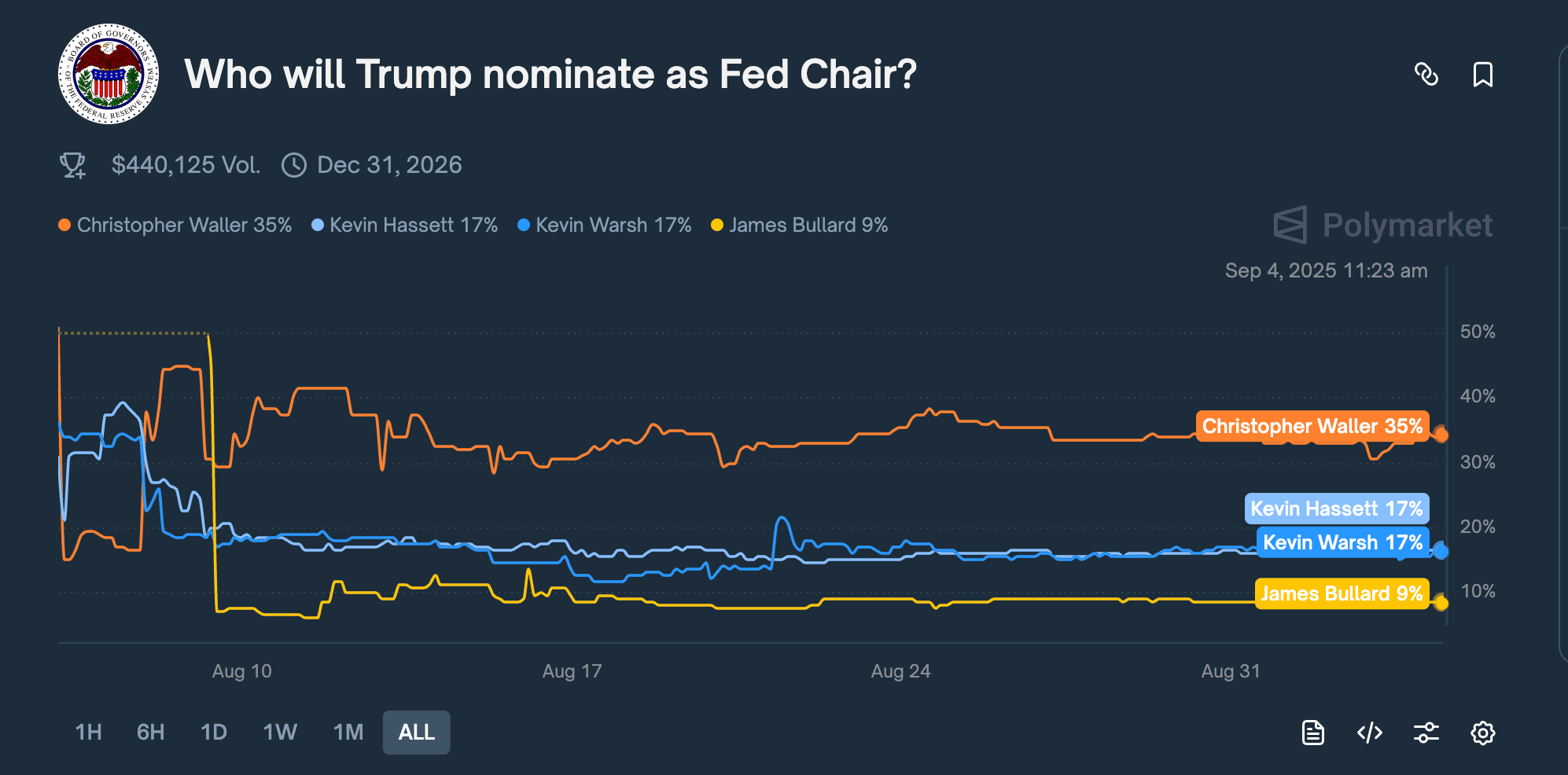
Why is the market suddenly bullish on the 65-year-old current Federal Reserve governor?
A recent Bloomberg report may provide a clue: Trump's advisory team believes Waller is "willing to make policy based on forecasts rather than current data" and has "in-depth knowledge of the Federal Reserve system."
More importantly, Waller was Trump's nominee to the Federal Reserve Board in 2020. At the FOMC meeting on July 30, Waller himself did something particularly eye-catching:
He and fellow governor Michelle Bowman voted against the decision, arguing that the Fed should cut interest rates by 25 basis points. This was the first time since 1993 that two governors simultaneously dissented from a resolution to keep interest rates unchanged.
What Trump needs now is a Federal Reserve chairman who can push for interest rate cuts without being seen by the market as a puppet of the White House; from this perspective, Waller seems to fit the bill perfectly.
Political acumen, choosing the right time to express your stance
To understand Waller, we have to start with this dissenting vote.
Let me explain the background: The Federal Open Market Committee (FOMC) of the Federal Reserve meets eight times a year to determine the benchmark interest rate in the United States. This interest rate is the main gate of the US economy, determining the cost of borrowing between banks and, in turn, affecting all loan rates.
Participants vote en masse on interest rate changes. For decades, those votes have been nearly unanimous. In Fed culture, publicly dissenting votes are seen as a challenge to the chairman's authority.
The FOMC meeting on July 30, 2025, is particularly sensitive.
The Federal Reserve has maintained interest rates at 4.25%-4.5% for five consecutive times. Meanwhile, Trump has been attacking Powell day after day on Truth Social, calling him "too late" and "stupid," and demanding an immediate rate cut to stimulate the economy.
Just two weeks before this meeting, on July 17, Waller gave a speech to the New York University Money Market Dealers Association, in which he offered a pointed comment:
"I used to tell my new colleagues that a speech is not a murder mystery— just tell the audience who the murderer is, and that's the point."
The focus of this speech, of course, was that he believed the FOMC should cut interest rates by 25 basis points; and the culprit was also projected onto the Federal Reserve.
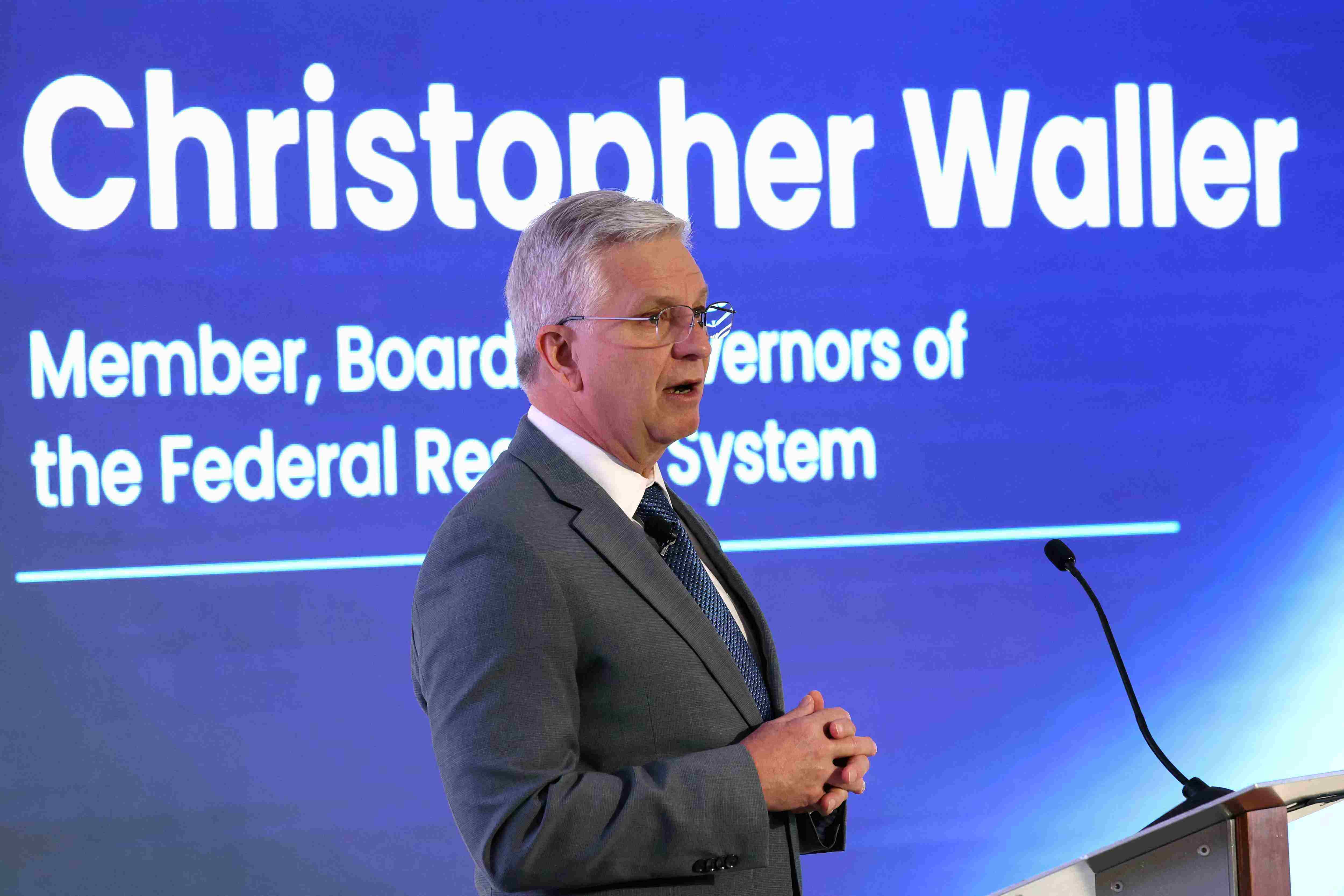
Generally speaking, public statements are not in line with the code of conduct for central bank officials. But this may be a carefully chosen moment for Waller to play political games.
Expressing opinions publicly in advance can, to some extent, make the dissenting vote at the formal FOMC meeting two weeks later appear to be based on long-term professional judgment rather than succumbing to some kind of political pressure.
When Waller and Bowman voted against keeping interest rates unchanged on July 30, it was indeed the first time since 1993 that two governors had dissented simultaneously, and it was obviously going to attract attention.
The signal read by the market is that rational and different voices have emerged within the Federal Reserve; but from the perspective of Trump and his team, this is more like a statement and stance by Waller.
Even more cleverly, Waller also expressed his opinion on the current tariff policy: "Tariffs are a one-time increase in price levels and will not cause sustained inflation." This sentence has become his iconic statement quoted by various media.
Translated, the subtext of this sentence is:
Trump's tariffs will indeed push up prices, but only temporarily. Therefore, tariffs shouldn't prevent interest rate cuts. Clearly, Waller's argument neither criticizes Trump's tariff policy nor provides an economic rationale for lowering interest rates.
Use an economic theory to resolve a political problem; choose the right time to express the same interest rate cut stance as the president.
Betting against the former finance minister, predicting a soft landing for the economy
If voting against the bill showed Waller's political acumen, then correctly predicting the direction of the economy demonstrated his strong business skills.
Let me start with the background.
In June 2022, the US inflation rate reached 9.1%, a 40-year high. What does this mean?
If you saved $10,000 at the beginning of the year, by the end of the year you only have $9,000 in purchasing power. Gas prices double, and eggs go from $2 to $5.
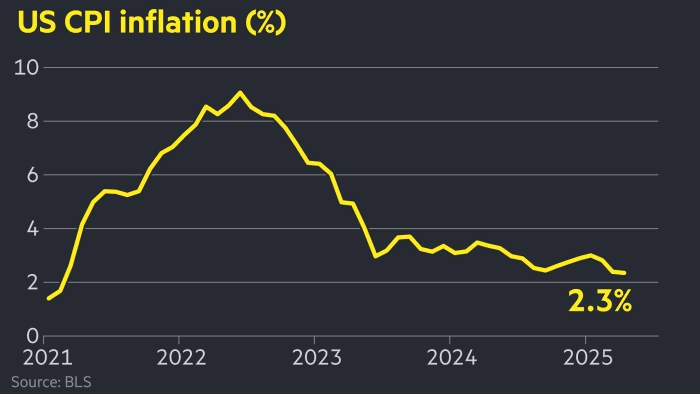
The Federal Reserve faces a difficult choice. To reduce inflation, it must raise interest rates. Raising interest rates will make loans more expensive, making businesses less willing to borrow for expansion and consumers less willing to take out loans for homes and cars. This will cool the economy and reduce inflation.
But the problem is that if the drug is too strong, it will cause problems. Historically, every time the Federal Reserve has raised interest rates significantly, it has triggered an economic recession.
At this time, a rare public debate broke out in the economics community.
On one side are three heavyweight economists: Summers, former Treasury Secretary during the Clinton administration, Blanchard, former IMF chief economist, and Harvard economist Domarsh.
In July, they published a study arguing that the Fed cannot control inflation without causing a "painful" surge in unemployment. To bring inflation down, unemployment must rise. This is an economic law, just like the laws of physics.
Summers' team calculated that to reduce inflation from 9% to 2%, the unemployment rate would have to rise to at least 6%, which would mean millions of people would be unemployed.
But Waller disagrees.
On July 29, he and Federal Reserve economist Andrew Figura published a paper titled "What Does the Beveridge Curve Tell Us About the Likelihood of a Soft Landing?" , directly challenging the conclusions of Summers' team.
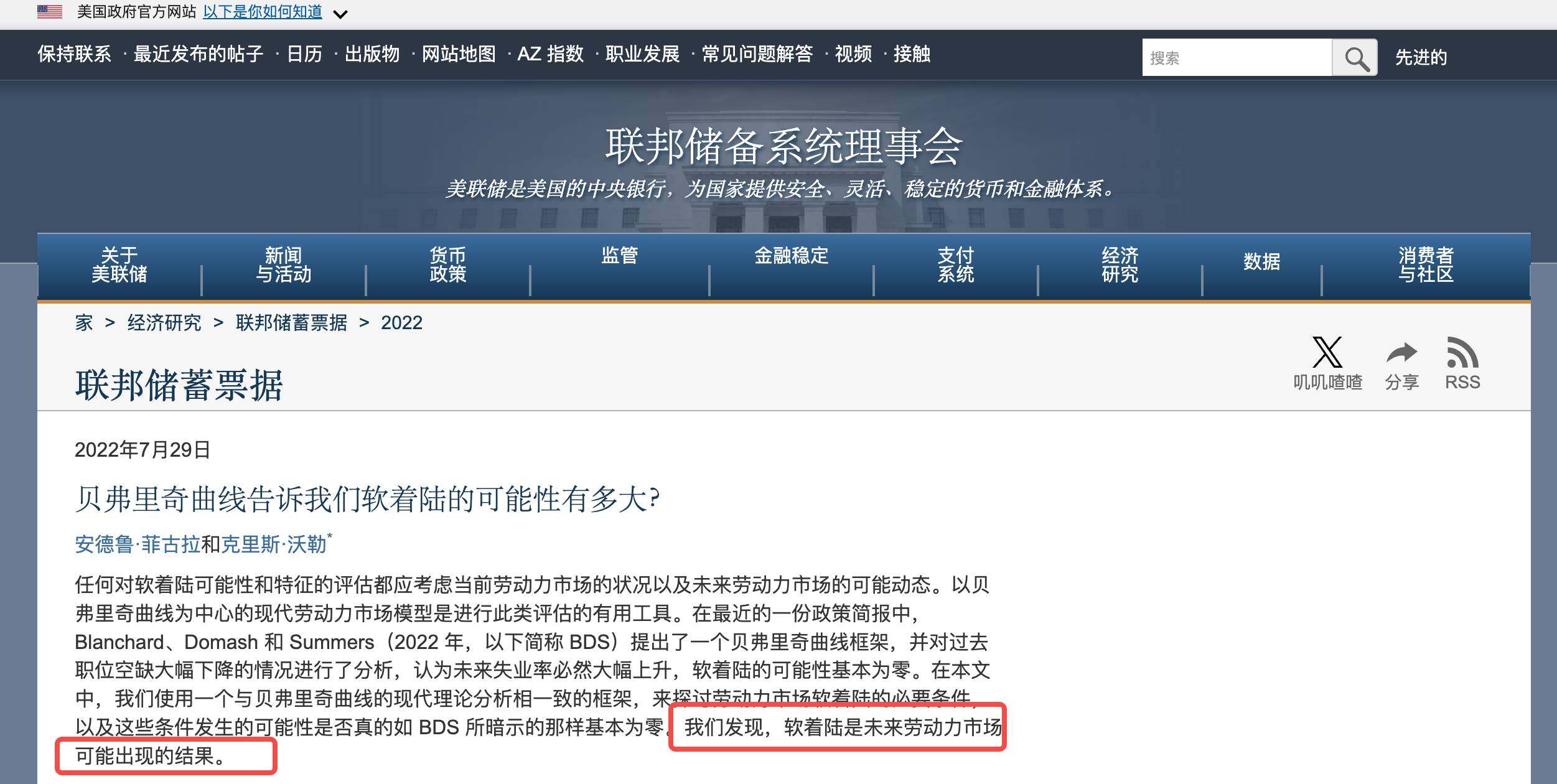
Waller’s core argument is that this time is different because the pandemic has created unprecedented labor market distortions.
Many people are retiring early, and many are unwilling to work due to the pandemic. This has led to inflated job vacancies; it's not that the economy is really that hot and hiring everywhere, but that fewer people are willing to work.
The paper concludes that a soft landing is a "reasonable outcome" and that the United States can return inflation to normal with only a slight increase in unemployment.
On August 1, Summers and Blanchard quickly fired back, saying Waller's paper "contains misleading conclusions, errors and factual errors."
Central bank officials usually choose their words with caution, and scholars are usually polite to each other. But this time, both sides spoke strongly, seemingly defending the correctness of their own economic theories.
The market is naturally on Summers' side. After all, he's a former Treasury secretary, and Blanchard is a former IMF chief economist. Waller, on the other hand, is only a Fed governor.
The next 18 months became a public verification and bet.
Commodity prices began to fall in late 2022, and supply chain pressures eased in early 2023. The Federal Reserve did raise interest rates significantly, from near 0% to 5.5%.
Everyone was waiting to see if there would be a wave of unemployment, but the results were surprising.
By the end of 2024, inflation has fallen below 3% and unemployment is only 3.9%. There is no recession and no mass layoffs.
In September 2024, Waller and Figura updated their research paper, even adding an "s" to the title --- from "Soft Landing" to "Soft Landings," suggesting that this was not a coincidence but could be repeated.
Waller won the bet.
The academic exchange also demonstrated Waller's ability to challenge authority and make independent judgments; for the Trump team, this was even more valuable. They saw someone who dared to challenge the mainstream and believed in the resilience of the American economy.
Midwestern scholars venture into Washington
Waller has had a unique career path unlike most people who serve at the Federal Reserve.
Waller was born in Nebraska City, Nebraska, a small town of only 7,000 people, in 1959. He spent his childhood in South Dakota and Minnesota, both agricultural states in the Midwest of the United States, far from the financial centers of the East Coast.
The seats on the Federal Reserve Board are usually filled with people who graduated from Ivy League schools, worked on Wall Street, or served in Washington government departments. They often speak the same language and have similar worldviews.
Waller certainly doesn't fall into that category.
Waller got his start at Bemidji State University, where he earned a bachelor's degree in economics; but you might not even have heard of this place in northern Minnesota, where winter temperatures can drop to -30 degrees Celsius.
Growing up in such an environment may make it easier to see the real America and the ordinary people who live in small towns, take out loans to buy houses and cars, and worry about jobs and prices.
In 1985, Waller received his Ph.D. in economics from Washington State University and began his long academic career.
First at Indiana University, then at the University of Kentucky, and finally at the University of Notre Dame, he spent 24 years teaching and conducting research. Waller's research focused on monetary theory, one of the most abstract branches of economics.
This kind of research obviously won’t make you appear on TV or become a star economist, but it might come in handy at a critical moment. In 1996, Waller and others co-authored a paper titled “Central Bank Independence, Economic Behavior, and Optimal Term.”

This paper examines a practical and timely question: How long should the term of office of a central bank governor be?
The paper's core finding is that if the term is too short (e.g., 2 years), the central bank governor will succumb to political pressure because he wants to be reappointed. If the term is too long (e.g., 14 years), he may become out of touch with reality and inflexible.
25 years later, this theoretical paper has become a practical guide.
In 2020, when Trump publicly criticized the Federal Reserve and demanded an interest rate cut, Waller, who had just joined the Federal Reserve, faced a choice: complete obedience or complete confrontation?
He chose a third way: to support a rate cut at some point, such as by voting against it in a referendum in July 2025; but the reasons must be professional, not because the president wants us to cut interest rates.
This delicate balance, neither so independent as to ignore political realities nor so dependent as to lose professional judgment, is exactly what he had studied more than 20 years ago.
In other words, Waller is not walking a tightrope at the Federal Reserve based on intuition, but rather has a set of academically verified balance theories.
Before joining the Federal Reserve, Waller also fought monsters and leveled up in the "training ground".
The Federal Reserve is not a single institution, but consists of a board of governors in Washington and 12 regional Fed banks, each of which has its own research department and policy preferences.
In 2009, at the age of 50, Waller left academia and joined the Federal Reserve Bank of St. Louis as Director of Research, a position he held for 11 years. Overseeing a research department of over 100 people, Waller's daily work included analyzing economic data, writing policy reports, and participating in preparations for FOMC meetings.
What really changed his career trajectory was being nominated by Trump to join the Federal Reserve Board in 2019.
The nomination itself was fraught with controversy. Waller's confirmation process was also not smooth, with Democratic senators questioning his independence, given that he was nominated by Trump. Republican senators worried that he was too academic and not "loyal" enough.
On December 3, 2020, the Senate confirmed his appointment by a narrow margin of 48 to 47, one of the closest votes in recent years. At 61, Waller is older than most of the Fed's board members when he joins the top policymaking body. This, however, can be an advantage.
The path of most Federal Reserve Board members is predictable: elite university → Wall Street/government → Federal Reserve. They enter the center of power in their 40s, giving them ample time to build relationships and learn the rules of the game.
Waller was different. He spent 24 years in academia and 11 at the regional Federal Reserve before moving to Washington at age 61.
Compared with other directors, Waller does not have too many burdens and does not owe favors to Wall Street. At the same time, he has worked at the Federal Reserve of St. Louis and knows that the Federal Reserve is not a monolithic entity. Different voices are not only tolerated but sometimes encouraged.
These are the qualities Trump's team may be looking for as they evaluate who could replace Powell:
Someone who is old enough and doesn't have to prove anything anymore; someone who has independent judgment but knows how to express it within the system.
Good for crypto?
What benefits would it bring if Waller really became the Chairman of the Federal Reserve?
The market's first reaction is that Waller will cut interest rates. After all, he voted against the rate cut in July. Trump has also been calling for lower interest rates.
But a closer look at his record reveals a more complicated picture.
In 2019, when the economy was strong, Waller favored rate cuts. In 2022, when inflation surged, he favored aggressive rate hikes. In 2025, he switched back to favoring rate cuts...
His principles also seem clear: loosen when necessary and tighten when necessary. If he becomes chairman, interest rate policy may be more "flexible," not necessarily mechanically following Trump's rules, but adjusting quickly based on economic conditions.
But what really makes Waller different may not be traditional monetary policy, but how he views new things such as cryptocurrencies and stablecoins.
On August 20, when asked how the Federal Reserve would respond to financial innovation, Waller said that "there is absolutely no need to worry about digital asset innovation"; at a stablecoin conference in California in February this year, he said that stablecoins are "digital assets designed to maintain a stable value relative to national currencies."
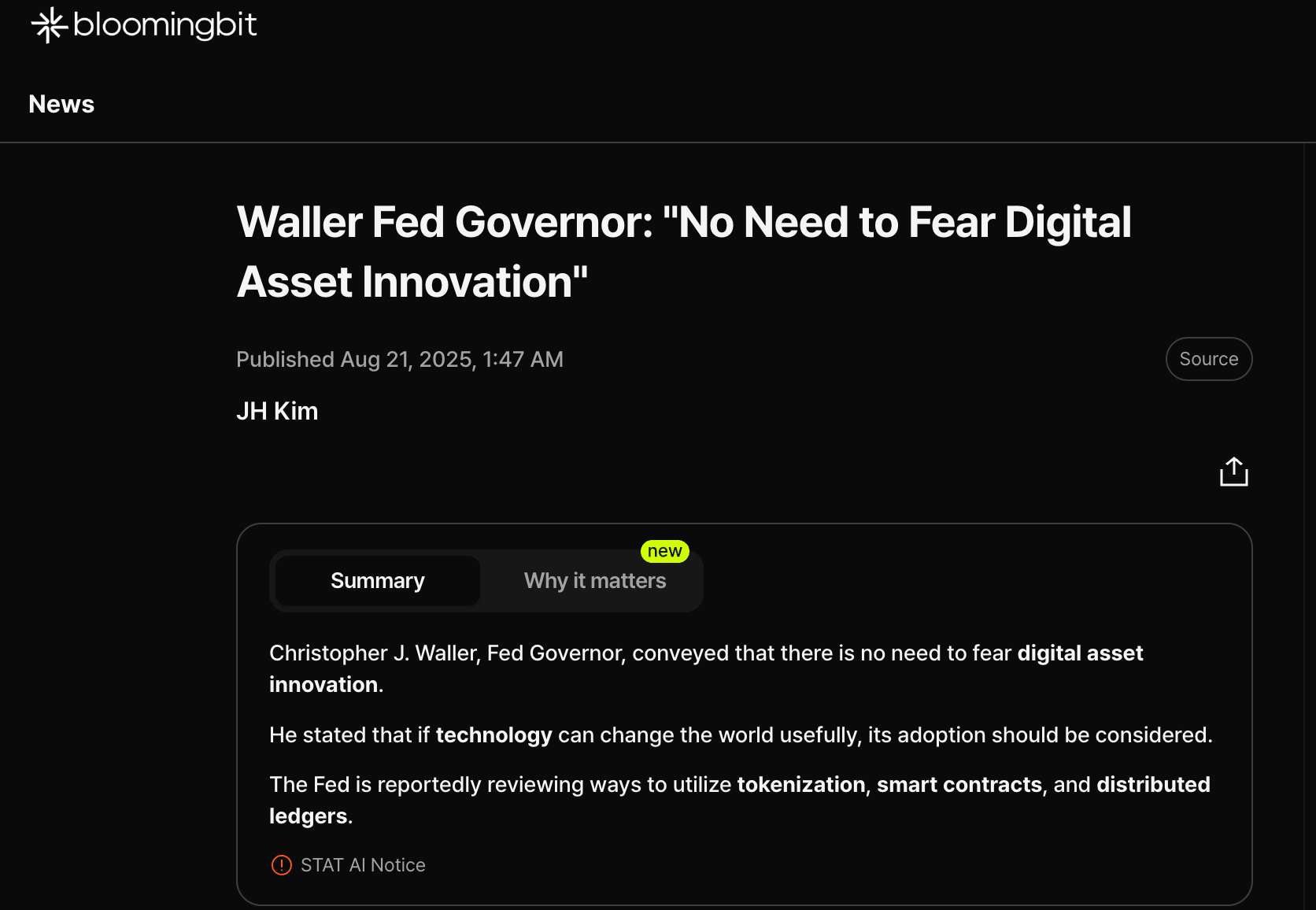
Note that he emphasizes the relationship with the national currency, not something independent of the monetary system. This difference in perspective could lead to a fundamental shift in policy.
The United States’ current attitude towards digital assets is defensive, with concerns about money laundering, financial stability, and investor protection; the focus of supervision is on “controlling risks.”
Waller explicitly opposes central bank digital currency, believing that "it is unclear what market failures in the U.S. payment system it can solve," but he supports another path: allowing private stablecoins to innovate and assume the functions of a digital dollar.
But all these assumptions are based on the premise that Waller can withstand the pressure.
He hadn't experienced the true test of a financial crisis. When Lehman Brothers collapsed in 2008, he was teaching. When FTX went bankrupt in 2022, he had just joined the Federal Reserve and was not yet a core policymaker.
The transition from director to chairman is more than just a change of position. Directors can express their personal opinions, while every word of the chairman can shake the market.
When the stability of the entire financial system is at stake, "innovation" and "exploration" may become luxuries. Whether this is entirely beneficial to encryption remains unknown.



